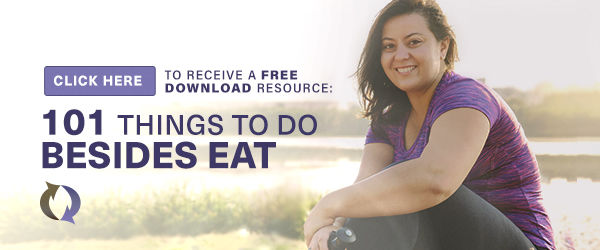Has your “healthy eating plan” become just another diet? Do you restrict yourself from eating certain foods, then find yourself struggling to stick to your plan? If you’re having difficulty making changes to the way you eat, what is your motivation to change your diet?
A diet by any other name is still a diet
I originally developed the Restrictive Eating Cycle to describe the diet phase of the eat-repent-repeat cycle. Restrictive eating, as most people who have struggled with chronic yo-yo dieting and weight cycling know from personal experience, fuels the Overeating Cycle. Restriction, deprivation, and guilt become additional emotional triggers for overeating.
But nowadays, I recognize there’s a long list of eating patterns with the potential to become part of a Restrictive Eating Cycle and interfere with your ability to change your eating.
Let’s explore your motivation for changing your diet and your how to set a more effective intention for making a voluntarily dietary change.
When “healthy eating” becomes just another diet
There’s no universal definition of “healthy eating” everyone would agree on. Besides, “healthy eating” isn’t a fixed target; it changes with your age, your lifestyle, your medical conditions, and myriad other factors.
Therefore, when it comes to your motivation to change your diet, the most important thing to focus on isn’t the food. It’s you and your relationship with food.
Even when you make a voluntary change in your eating in the name of “health,” without mindfulness, the “plan” can mutate into rules. As a result, you may find yourself hyperfocused on food, with less energy left to focus on living the healthy life you set out to achieve!
Has your motivation to change your diet fed orthorexia?
Have you heard of orthorexia? The term orthorexia, which literally means righteous eating, is not an “official” eating disorder, but describes an increasingly common pattern of problematic eating. It results from an excessive focus on healthy eating.
One feature of orthorexia is an exaggerated faith that inclusion or elimination of particular foods can prevent or cure disease or affect one’s daily well-being. As a result, food becomes more powerful and the need to control it can take on a life of its own.
7 questions to assess your motivation to change your diet
Answer these questions to explore and understand your motivation for making dietary changes. Your answers will help you focus on your motivation to change your eating, so your changes don’t become part of a Restrictive Eating Cycle.
1. What is your intention for changing your diet?
Your intention is your “why.” Why are you considering a particular dietary change? Many people choose a specific plan because they believe it will help them feel, perform, or look better, and/or live a longer, healthier life.
However, if you’re not mindful, following “the plan” perfectly can become the primary objective so it becomes a distraction, an obsession, or worse.
If you notice that following the plan has become more important than your “why,” then it’s time to reassess your focus. (Read The Differences between goals and intentions for help with this.)
2. Do you feel restricted?
It’s only “restrictive eating” if you feel restricted. In other words, if you simply choose to limit or eliminate certain ingredients or foods (for whatever reason) and you don’t feel deprived, then it’s not an issue!
Just because you can eat anything doesn’t mean you will. Like every other decision point in the Mindful Eating Cycle, you are in charge of deciding for yourself.
However, sometimes feeling restricted has become your “normal.” So, to help you clarify whether what you are experiencing is restrictive, ask yourself whether any of these sound familiar:
- I find myself thinking about the foods I don’t eat.
- I feel deprived of the foods I love.
- I crave foods I’m not supposed to eat.
- I am on a perpetual quest to find replacement foods for foods I miss.
- I feel guilty when I deviate from the plan.
- I give myself “free days” or “cheat days” so I can tolerate all the rest of the days.
- I look forward to the day when I no longer have to eat this way.
3. Does your life feel bigger or smaller?
Think about the reasons you wanted to change your diet. Are you able to enjoy the health you intended to cultivate? In other words, is your life becoming bigger?
Or, are you are investing so much of your attention, time, and energy in following your plan that you can’t fully enjoy your life (your life is becoming smaller)?
Here are some ways your plan could be making your life smaller.
- I’m preoccupied with nutrition information.
- I’m overly focused on rules about when, what, and how much to eat.
- I often worry about what I eat.
- I am constantly thinking and talking about food.
- I sometimes don’t eat even though I’m hungry.
- I avoid or feel left out in certain social situations.
- It is difficult to enjoy a meal with my family.
- It is difficult to eat out with friends or coworkers.
- I feel judgmental about what others eat.
- I often feel tired or become ill, possibly as a result of my diet.
Mindful eating can help you improve your health while still having enough bandwidth left over to enjoy it!
4. Is the change in your diet worth it?
Mindful decision-making is about weighing the pros and the cons of your options.
For example, if the disadvantages of a certain change in your diet, such as inconvenience and limited options, outweigh the advantages of feeling better, you are unlikely to stick with that plan.
If you feel the change you want to make is important, do what you can to mitigate the disadvantages and optimize the advantages to improve the likelihood you’ll stick with it. (For more on how to make non-restrictive dietary changes for medical conditions or health concerns such as diabetes or an allergy, read this article, What If I Can’t Eat What I Love.)
This may mean making a less drastic change to start with, which brings us to the next question.
5. Would moderation be more effective than “none”?
A huge trend these days is to eliminate certain foods or ingredients completely (for example, gluten, sugar, red meat, and so on). Again, if you don’t feel restricted when you choose not to eat certain foods or ingredients, then this isn’t a problem.
However, if you’re concerned about eating a particular food or ingredient for health reasons, eating it less often and in moderation is a better place to start (unless you have an allergic reaction to it of course).
Experiment with smaller changes that allow you to adjust gradually and notice how your body responds. Ultimately, small steps that you are able to sustain are more effective than a temporary overhaul.
Small steps lead to lasting changes over time.
6. What about pleasure?
Let’s not forget that while the primary purpose of eating is to provide fuel and nutrition for our bodies, enjoyment is an important and legitimate reason for eating.
If eating has become joyless, something is seriously wrong. Learning to balance eating for enjoyment with eating for nourishment will help you eliminate the Restrictive Eating Cycle. (See the chapter Fearless Eating in Eat What You Love, Love What You Eat.)
7. Have you turned mindful eating into another diet?
Mindful eating is not another diet. Mindfulness simply boils down to nonjudgmental awareness of the present moment. Period. And that makes all the difference when making decisions that are focused on how you want to feel, rather than on trying to “be good.”
As soon as you begin telling yourself (or others) restrictive messages like these, you have turned the Mindful Eating Cycle into a Restrictive Eating Cycle:
- You should only eat when you are hungry.
- You should stop eating before you are full.
- You have to be mindful of what’s in the food you are eating.
- You have to eat slowly, chew each bite x times, and never eat while distracted.
And we already know how that will turn out!
(For more on how to apply specific strategies from the Am I Hungry? mindful eating programs that help you improve your diet even when you are eating what you love, read 7 Am I Hungry? Mindful Eating Strategies that Help You “Eat Better.”)
Enjoyed this article? Here are three more to help you:
How to Turn Mindful Eating Into a Diet
In Charge or In Control: Which Are You?
Mind Full Eating Is Not Mindful Eating
This has been updated from a previously published article.


